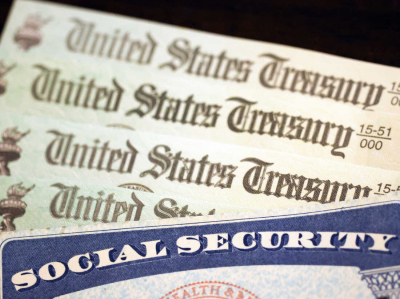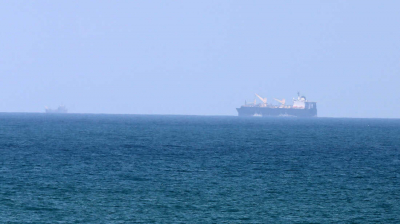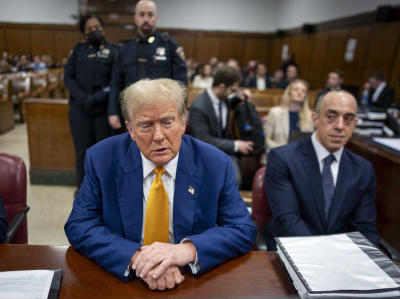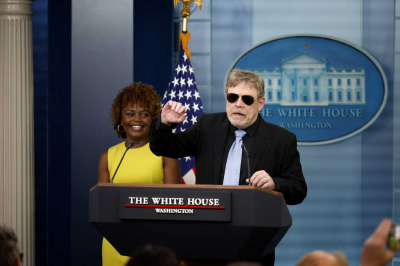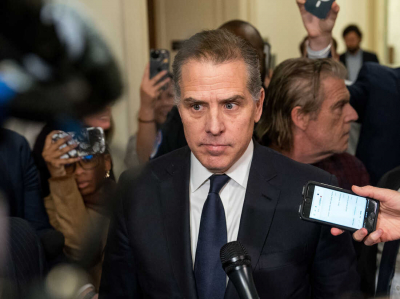
In the Balance: Supreme Court Weighs Trump's Claim of Presidential Immunity from Prosecution
A momentous occasion unfolds within the hallowed chambers of the U.S. Supreme Court this Thursday. The justices convene to deliberate on a pivotal matter: Donald Trump's assertion of immunity from prosecution post-presidency for his official actions while in office. Central to Trump's argument is his stance that the maneuvers he undertook to challenge the certification of Joe Biden's election constitute official duties, shielding him from criminal indictment.
Never before has the Supreme Court been tasked with adjudicating the question of presidential immunity from criminal prosecution subsequent to leaving office. NPR launches special live coverage moments before the 10 a.m. commencement of the Supreme Court session. Tune in via the NPR app or simply click on the player below to follow the proceedings.
Drawing parallels to history, the case echoes past controversies. President Richard Nixon, implicated as an unindicted co-conspirator in the Watergate scandal during his tenure, eluded prosecution due to the Justice Department's interpretation that a sitting president enjoys immunity from criminal charges. Nixon's eventual resignation in 1974 paved the way for a presidential pardon from his successor, President Gerald Ford.
Trump's defense, however, ventures beyond Nixon's precedent. He contends that immunity shields him indefinitely from prosecution for his official actions, unless preceded by impeachment, Senate conviction, and removal from office. Despite facing impeachment twice, Trump evaded conviction in the Senate both times, a fact with profound implications.
The scope of Trump's protected "official acts" is expansive, as illuminated by a poignant exchange in a federal appeals court earlier this year. When queried by Judge Florence Pan whether a president could order military action like the assassination of a political rival, Trump's lawyer argued that prosecution post-presidency would only be feasible following impeachment and conviction.
The implications of the Supreme Court's ruling are monumental. Should Trump's argument prevail, it sets a precedent wherein presidents, present and future, enjoy immunity from legal repercussions for their official actions beyond their term's end—a seismic shift in the dynamics of executive accountability.
A Legal Crossroads: Trump's Immunity Battle Takes Center Stage at the Supreme Court
In a landmark ruling this February, a three-judge appeals court panel, comprising two Democratic and one Republican appointee, delivered a unanimous verdict against Trump on the immunity question. Undeterred, Trump escalated the legal fray to the highest echelon of judicial authority—the Supreme Court. However, conspicuously absent from today's proceedings is the former president himself, obligated to attend his New York trial on charges related to alleged falsification of business records to sway the 2016 presidential election.
While Trump faces a cluster of criminal indictments, only one commands the Supreme Court's attention today: special counsel Jack Smith's case, accusing Trump of knowingly and falsely impeding Biden's ascension to the presidency. Beyond scrutinizing presidential immunity, this high-stakes legal duel serves as a litmus test for the Supreme Court's mettle, both in substance and timing.
The ramifications of the court's decision extend beyond legal purview, potentially influencing the political landscape. Even if the court were to rule against Trump, the pace of proceedings could sway the trajectory of the impending November election. With the specter of a second Trump presidency looming, the possibility of evading legal repercussions through dismissal or self-pardon looms large.
Trump's legal representative, William Scharf, staunchly defends his client's actions, asserting that every alleged offense was an official act shielded by presidential immunity. Scharf contends that without such immunity, future presidents risk paralysis under the threat of post-election prosecution, impeding their ability to govern effectively.
However, dissenting voices within the legal fraternity, including Peter Keisler, a former top Justice Department official under the George W. Bush administration, vehemently oppose Trump's immunity claim. Keisler, alongside numerous high-ranking former GOP officeholders, rebuffs the notion that presidential immunity should shield actions tantamount to electoral malfeasance, asserting that safeguarding the presidency cannot entail shielding those who seek to subvert it.
A Legal Crossroads: Trump's Immunity Battle Takes Center Stage at the Supreme Court
In a landmark ruling this February, a three-judge appeals court panel, comprising two Democratic and one Republican appointee, delivered a unanimous verdict against Trump on the immunity question. Undeterred, Trump escalated the legal fray to the highest echelon of judicial authority—the Supreme Court. However, conspicuously absent from today's proceedings is the former president himself, obligated to attend his New York trial on charges related to alleged falsification of business records to sway the 2016 presidential election.
While Trump faces a cluster of criminal indictments, only one commands the Supreme Court's attention today: special counsel Jack Smith's case, accusing Trump of knowingly and falsely impeding Biden's ascension to the presidency. Beyond scrutinizing presidential immunity, this high-stakes legal duel serves as a litmus test for the Supreme Court's mettle, both in substance and timing.
The ramifications of the court's decision extend beyond legal purview, potentially influencing the political landscape. Even if the court were to rule against Trump, the pace of proceedings could sway the trajectory of the impending November election. With the specter of a second Trump presidency looming, the possibility of evading legal repercussions through dismissal or self-pardon looms large.
Trump's legal representative, William Scharf, staunchly defends his client's actions, asserting that every alleged offense was an official act shielded by presidential immunity. Scharf contends that without such immunity, future presidents risk paralysis under the threat of post-election prosecution, impeding their ability to govern effectively.
However, dissenting voices within the legal fraternity, including Peter Keisler, a former top Justice Department official under the George W. Bush administration, vehemently oppose Trump's immunity claim. Keisler, alongside numerous high-ranking former GOP officeholders, rebuffs the notion that presidential immunity should shield actions tantamount to electoral malfeasance, asserting that safeguarding the presidency cannot entail shielding those who seek to subvert it.
Constitutional Clashes: Debunking Trump's Claims of Presidential Immunity
The text of the Constitution has no provision granting this immunity. No court decision has ever recognized this immunity. The historical understanding in our country has always been exactly the opposite," asserts Keisler, highlighting the absence of legal grounding for Trump's immunity argument. "Fundamentally, Trump's argument is just at war with the basic precept of our system that says that no one's above the law.
Echoing Keisler's sentiment, NYU law professor Trevor Morrison rebuffs Trump's contention that his actions surrounding the 2020 election fell within a president's official duties. "The Constitution gives the president no role whatsoever in the administration of federal elections," Morrison asserts, underscoring the absence of presidential authority in electoral matters.
Dismissing Trump's assertion that prosecution hinges on prior impeachment and removal from office, Morrison deems such a notion "preposterous." Senate Republican Leader Mitch McConnell's rejection of this idea during the second Trump impeachment trial reinforces the principle that former presidents remain subject to the criminal justice system.
Trump's attorney, Scharf, warns of a potential cascade of recriminations and prosecutions at the conclusion of each presidency if the Supreme Court fails to curtail presidential liability now. Scharf argues that subjecting Trump to prosecution post-presidency for actions related to contesting election results sets a precedent with far-reaching implications, inviting scrutiny of past presidents' decisions.
Trump anchors much of his defense on a 1982 Supreme Court ruling granting presidents absolute immunity from civil lawsuits for official acts. However, the court's stance in that case explicitly refrained from addressing the applicability of such immunity to criminal prosecutions, leaving Trump's argument on shaky legal ground.
In conclusion, as the legal saga surrounding Trump's immunity unfolds, the echoes of historical precedent intersect with contemporary interpretations, shaping the path forward. The landmark decision in Nixon's case provides a backdrop against which the Supreme Court deliberates the boundaries of presidential accountability. However, the presence of justices with firsthand White House experience introduces layers of complexity to the proceedings.
Amidst this intricate legal terrain, the brief filed by former GOP officeholders advocates for a measured approach, rejecting immunity for post-election crimes aimed at undermining democratic processes. This nuanced stance highlights the evolving nature of legal discourse surrounding presidential accountability.
As the court navigates the delicate balance between past precedent and present exigencies, unresolved questions loom regarding immunity in matters of foreign relations and military authority. Ultimately, the outcome of Trump's immunity battle will reverberate far beyond the confines of the courtroom, shaping future interpretations of executive authority and the principle of presidential accountability in American governance.

